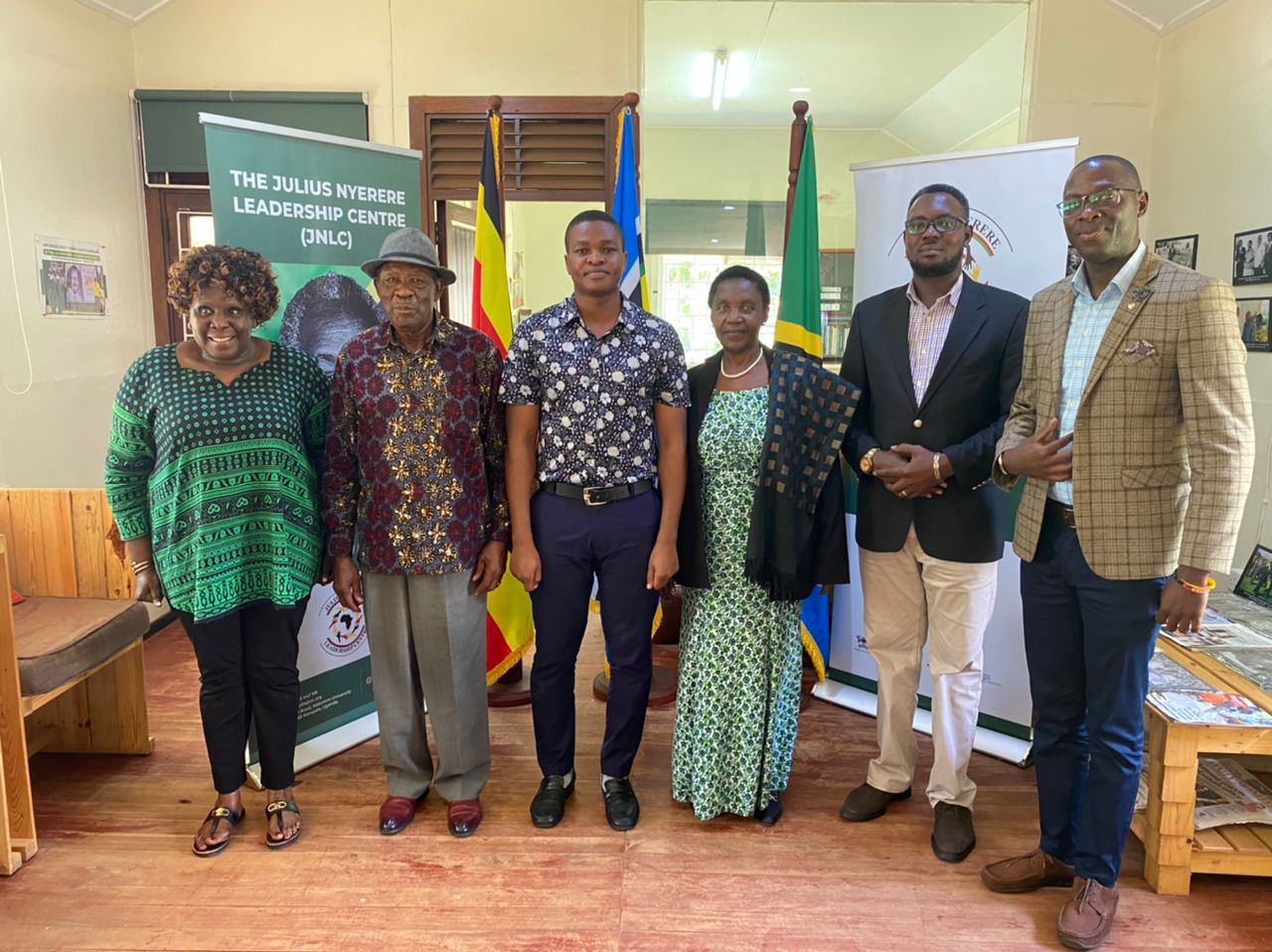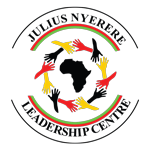On Tuesday, May 31st 2022, The Julius Nyerere Leadership Centre (JNLC) had the privilege to host a delegation of 10 people from Tanzania that included two granddaughters of the late Mwalimu Julius Nyerere’s; Ms. Bhoke Wankyo Nyerere and Ms. Regina Bumi Mwaipopo. Dr. Muwanga, the JNLC Executive Director, gave a brief outline of the Centre, its objectives and key activities. She emphasised the importance of the Centre as a Presidential Initiative that honoured the legacy of Mwalimu Julius Nyerere as a Pan-Africanist but also as a liberation champion who had actively supported different liberation struggles across Africa.

The visit was also an important way of underlining the importance of the broader JNLC agenda and the basic underpinnings of a closer working relationship with the Nyerere Foundation in Tanzania. Among the many areas of collaboration that were suggested by the visitors present was the Fellowship Programme that could attract Fellows from the Nyerere Foundation. Another area that was highlighted with potential for collaboration was the Youth Leadership Training Programme. It was suggested that since the Centre had already developed and piloted a curriculum for the Youth Leadership Training Programme this could be strengthened and mainstreamed as a regional University-wide programme.
The delegation was very receptive to the idea of actively participating in the two- day Youth Leadership Symposium that Dr. Muwanga had outlined the Centre will jointly be hosting with Makerere University as part of the lecture series to celebrate Makerere@100. One of the proposed activities of the symposium will be a call to students at both Makerere University and University of Dar es Salaam in Tanzania to submit as part of an essay competition a paper outlining Mwalimu Nyerere’s attributes that continue to resonate today and preserve his legacy.
The visit to the JNLC by the delegation from Tanzania ended with reflections from members of the delegation about what they most remembered about Mwalimu Nyerere and how it can help to reignite a renewed interest in a new generation of young African leaders. Ms. Bhoke Wankyo Nyerere revealed that she believes that if one was to revisit Nyerere’s writings and speeches, their relevance today is that they contain many of the solutions to Africa’s current problems since their emphasis is on unity, peace and self-reliance. She referred to Nyerere’s speech when he asked Tanganyika what kind of Tanzania they wanted and his speech on the development of people which she argued are still relevant today. She revealed that these speeches have been the basis for campaigns she has embarked -on in schools to prepare young people to know that they are Africans who have been marginalised and need to support investment in infrastructure development like hospital, roads, electricity, schools and making sure that goods and services are close to the people, all these speak to the development of people that Nyerere was passionate about. Therefore, for anyone who thinks about development and liberation of Africa, he/she should revisit Nyerere’s writings that till today hold many of the solutions. This sentiment was underlined by Mr. Joseph Butiku a long-time friend and Presidential advisor to Mwalimu Nyerere and currently the Executive Director of Mwalimu Nyerere Foundation in Tanzania. Mr. Butiku and his wife Mrs. Lonstansia Butiku, visited the Julius Nyerere Leadership Centre (JNLC) on June 2nd 2022. The visit followed their participation in the Intercessional Prayers for the Beatification and Canonisation Process of Mwalimu Julius K. Nyerere at Uganda Martyrs Catholic Shrine, Namugongo. These prayers were held two days before the country’s celebration of Uganda Martyrs on June 3rd 2022.
The purpose for the visit was to identify ways to strengthen the relationship between the Mwalimu Nyerere Foundation in Tanzania and the Julius Nyerere Leadership Centre (JNLC), Makerere University. Mr & Mrs. Butiku were surprised but equally appreciative of how the Centre had been widely engaged with the Tanzanian community in Kampala including the hosting of Nyerere Day, the Tanzanian Bazaar to commemorate Nyerere@100 as well as the support given to Tanzanian students during the pandemic. Mr. Butiku was of the view that both The Julius Nyerere Leadership Centre and Nyerere Foundation should align their programmes in order to streamline a smooth working relationship and future collaborations and partnerships that would help to uphold Nyerere’s Legacy.
In his remarks, Mr. Butiku, commended President Museveni for setting up the Centre and naming it after one of the Greatest Sons of Africa” and for being consistent on the Africa we want by recognising that we are Africans and we have an Identity.
Mr. Butiku recalled that when Mwalimu Nyerere retired he did not want statues, and buildings named after him because he believed that after a while people would demolish them. In its place he championed development that is people centred and which cannot be easily destroyed. He further revealed that Mwalimu Nyerere often asked those around him what they thought leaders work for in this world. He would answer his own question by highlighting the following:
- Leaders work for peace in the world
- Leaders work for unity in the world/ society
- Leaders work for people centred development in the world, specifically Africa and in all institutions
According to Mwalimu Nyerere, each individual, government or institution should work and play a modest role in pursuit of the above three objectives and this is what the Mwalimu Nyerere Foundation in Tanzania stands for. It meets these objectives through public dialogues and research and the Foundation’s Programmes include:
- Ujaama philosophy of promoting equality;
- Programmes that promote self-reliance;
- Democracy for people to own resources, processes and institutions;
- Programmes that promote unity.
Potential Areas for Collaboration
Mr. Butiku explored potential areas of collaboration that must be contextualised. Currently the survival agenda and competence for self-reliance that Mwalimu Nyerere advocated has become an urgent imperative. The combined impact of Covid-19 and Ukraine crisis has removed resources from developing countries generally and Africa specifically and now more than ever, Africa needs her own “Survival Agenda” because nation states cannot manage the outcome of these crises alone.
- There is need to build capacity, develop Africa that is united and self-reliant;
- Develop a Home Agenda that is self-reliant, people centred, involving everyone for ownership, and preach peace and unity for greater cooperation;
- Need for a campaign by civil institutions to mobilise people together with their governments, to understand our selves and how to be who we are;
- Organise an International Conference of the Great Lakes to build consensus around the liberation of humanity and the unity that Nyerere believed in;
- Organise seminars on gender and other cross-cutting issues for young people;
- Create a Civil Society Forum for African countries;
- Improve security, service delivery by advancing solutions to governance issues including corruption, unemployment, ethnicity;
- Need to question why Africa Free Trade Area is dominated by foreigners;
- Create a space to curate our own stories as Africans;
- Use Nyerere’s occasions to address issues about people that influence humanity.

